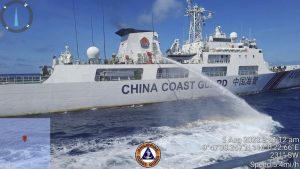The Philippine military will temporarily stop sending cadets to China following the latest incident of Chinese assertiveness in the disputed waters of the South China Sea, an official announced on Wednesday.
“I ordered the temporary stoppage of sending officers to China,” Romeo Brawner Jr., the chief of staff of the Armed Forces of the Philippines (AFP), told a Commission on Appointments’ Committee on National Defense hearing, according to CNN Philippines.
Brawner told the committee that he received an invitation last week from China’s government to send cadets to join a worldwide conference, but declined the invitation.
The Philippines has participated in a military student exchange program with China since 2004, under the memorandum of understanding on defense cooperation signed that year. The agreement was part of a significant expansion of bilateral relations that took place under the administration of President Gloria Macapagal Arroyo, who famously declared a “golden age” in relations.
But the arrangement has become increasingly incongruous in the context of the growing frictions in the South China Sea, which have increased in seriousness and frequency since President Ferdinand Marcos Jr. took office in June of last year.
The latest incident took place on August 5, when a China Coast Guard vessel blocked and shot a water cannon at a Philippine navy-chartered supply boat in the vicinity of Second Thomas Shoal, which Manila refers to as Ayungin Shoal and Beijing as Ren’ai Jiao. As a result, it was forced to abandon its attempts to resupply the Sierra Madre, a decrepit World War II-era ship that was intentionally grounded in the shoal’s shallow waters in 1999. This came after a similar incident near Second Thomas Shoal in February involving a Chinese Coast Guard vessel, this time involving the use of a military-grade laser.
The Chinese actions prompted strongly worded protests from both the AFP and PCG, which condemned them as “excessive and offensive,” while the Department of Foreign Affairs summoned Chinese ambassador Huang Xilian for a formal rebuke. While the AFP and Philippine Coast Guard (PCG) successfully resupplied the troops on August 22, concerns are growing within the country’s security establishment about the future of the Sierra Madre, which appears to be the subject of something approaching an informal Chinese blockade.
This week, the Philippines has been among the many Asian nations that have protested China’s release of a new “standard map” showing its “nine-dash line” South China Sea claim. Concerns about national sovereignty in what Manila terms the West Philippine Sea is also one of the primary drivers of the recent rapid improvements in the security alliance with the United States, which has resulted in an expansion of American access to the country’s military facilities.
In general, the Philippines has been quite adept so far at balancing the beneficial aspects of its relationship with China – particularly its economic ties – with outstanding maritime and territorial disputes. But as the AFP’s suspension of its student exchange program shows, there are only so many incidents that the Philippines can accept before it will lead to significant reverses in bilateral relations.

































